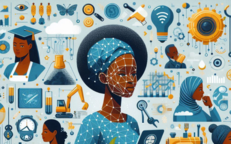Unleashing Africa's Potential: A Path to Sustainable Development

Africa, often referred to as the "cradle of civilization," possesses a rich tapestry of cultures, resources, and resilience. Yet, it is a continent that has long grappled with challenges ranging from poverty and conflict to underdevelopment and inadequate infrastructure. However, amidst these challenges lies immense potential and opportunity for transformative growth and development. In this opinion piece, we delve into Africa's development trajectory, backed by compelling statistics, to advocate for a renewed commitment to unlocking its full potential.
Economic Growth and Investment
Africa's economic landscape has been steadily evolving, with several countries experiencing robust growth rates in recent years. According to the African Development Bank, the continent's GDP growth averaged 3.4% in 2019, and despite the COVID-19 pandemic's impact, it is projected to rebound to 3.4% in 2021. This resilience underscores Africa's potential as an attractive destination for investment and economic diversification.
Foreign direct investment (FDI) inflows to Africa have also been on the rise, reflecting growing investor confidence in the continent's prospects. In 2020, FDI flows to Africa increased by 11% to $40 billion, driven by investments in renewable energy, digital infrastructure, and the agribusiness sector. These investments not only spur economic growth but also create job opportunities, foster innovation, and contribute to sustainable development.
Human Capital Development
Investing in human capital is paramount for Africa's long-term development and prosperity. Education and healthcare are fundamental pillars of human capital development, yet many African countries continue to grapple with challenges such as inadequate access to quality education and healthcare services.
According to UNESCO, sub-Saharan Africa has made significant strides in improving access to education, with primary school enrollment reaching 79% in 2018. However, challenges persist in terms of quality and retention rates, highlighting the need for targeted interventions to enhance educational outcomes.
Similarly, healthcare systems across the continent face numerous challenges, including limited infrastructure, healthcare workforce shortages, and inadequate funding. The COVID-19 pandemic further exposed these vulnerabilities, underscoring the urgency of strengthening healthcare systems and investing in healthcare infrastructure, research, and capacity building.
Infrastructure Development
Infrastructure is the backbone of economic development, facilitating trade, connectivity, and access to essential services. Africa's infrastructure deficit remains a significant barrier to growth, with inadequate road networks, unreliable power supply, and limited access to clean water and sanitation hindering socio-economic development.
The African Union's Programme for Infrastructure Development in Africa (PIDA) aims to address these challenges by promoting regional infrastructure projects in sectors such as transportation, energy, and water resources. However, funding constraints and bureaucratic hurdles continue to impede progress, highlighting the need for innovative financing mechanisms and enhanced public-private partnerships to accelerate infrastructure development.
Harnessing Digital Innovation
Digital innovation holds immense promise for Africa's development, offering opportunities to leapfrog traditional barriers and drive inclusive growth. The continent has witnessed a digital revolution in recent years, with mobile technology and internet penetration rates soaring across many countries.
Mobile money platforms have revolutionized financial inclusion, providing millions of Africans with access to banking services, savings, and credit. In Kenya, for example, the adoption of mobile money has transformed the country's economy, driving financial inclusion and empowering small businesses and entrepreneurs.
Moreover, the rise of fintech startups, e-commerce platforms, and tech hubs across Africa is fueling innovation and entrepreneurship, creating new avenues for job creation and economic empowerment. Governments and policymakers must prioritize digital infrastructure development, digital literacy, and regulatory frameworks to harness the full potential of digital technology for sustainable development.
Conclusion
Africa stands at a critical juncture in its development journey, with unprecedented opportunities and challenges shaping its future. By leveraging its vast resources, harnessing digital innovation, and investing in human capital and infrastructure, the continent can unlock its full potential and embark on a path to sustainable development.
However, realizing this vision requires a concerted effort from governments, the private sector, civil society, and international partners. It demands bold leadership, innovative solutions, and a commitment to inclusive and equitable development that leaves no one behind.
As we navigate the complexities of the 21st century, let us seize this moment to reimagine Africa's future and build a continent that is prosperous, resilient, and sustainable for generations to come.


